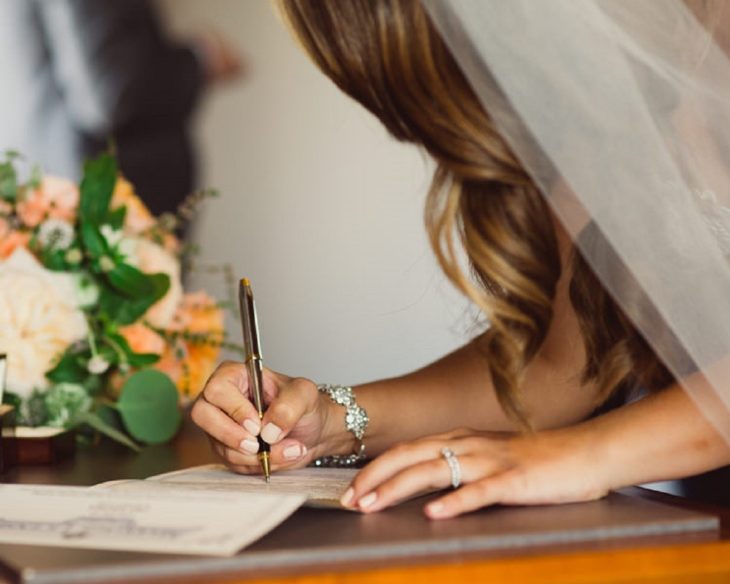Pretty much everything about Kale and I getting married was untraditional. But we were actually quite traditional by not moving in together until a few days before our wedding.
Kale and I certainly weren’t opposed to premarital cohabitation on principle: both of us had lived with exes in long-term relationships before. We simply hadn’t been together long enough to move in together: we had only been dating for four months when we got engaged and got married just five weeks after that (yeah, we moved quick). Kale ending his lease in Brooklyn to move into my apartment in Queens a few days before our wedding was pure circumstance.
By cultural standards, the “getting married” part is supposed to be the huge change that occurred in my life. One minute I was filing my taxes solo and then — ba-bam! — I’m legally joined to another person by law. And to be sure, sponsoring Kale for immigration was also a significant event. But the honest truth is that the biggest change during that time, in terms of how it affected my life and how I had to adjust and grow as a person, was acquiring not just a new husband but a new roommate.

Source: womansday
To be clear: Kale fills every day of my life with joy. Both of us feel that being with the other is easy. I knew he should my life partner because around him I’m more me: more silly, more fun, much more confident. Simply put, I’m happy every day; the greatest joy of marriage to him has been falling even more in love with him as time passes. And it is with this easiness, this happiness and this love that I’ve adjusted to living with a new husband and cohabitator. Like any couple newly living together, we’ve had to adjust to each other’s movements: how each of us sleeps, how each of us cleans, how each of us gets out the door in the morning. (We live with the roommate I’d already been living with — my close friend since sixth grade — so we adjust to her habits as well.) The first six to eight months of marriage involved a lot of learning about each other’s domestic likes, dislikes and peccadilloes in ways that most modern couples already know everything about before they’re share a cable bill. But I won’t pretend every minute of cohabitation has been easy. The hard part hasn’t been establishing what an acceptable amount of dishes to leave in the sink at one time is; the hardest part has been the fact that I’m an introvert.
Introversion is one of my strongest personality traits. Contrary to the stereotypes that introverts are shy, antisocial or selfish, this just means I take refuge inside my own mind for the good of everyone. Groups of people don’t do much for me, as I’m much more outgoing one-on-one. I focus intensely and I’m also easily distracted — and annoyed — by external stimulation; loud talking and loud noises grate on my nerves. While I love to go out for cocktails and I’m always down for shopping with my girl friends, afterwards I’ll need a good few hours to myself. I need to recharge my batteries at least a little bit pretty much every day. (The book Quiet: The Power Of Introverts In A World That Can’t Stop Talking by Susan Cain is a good introduction to introversion.)
When I can’t “introvert out,” as I call it, I’m resentful and cranky. Resentment and crankiness, I’m sure, are not tools for a successful marriage. Yet even living in an apartment that’s relatively large by New York City standards doesn’t make self-imposed seclusion particularly easy; we overlap and interrupt constantly, even if it’s just to find an iPhone cord. So I have to force myself to withdraw and carve out time to reboot, which can be hard. Naturally, that’s partially due to the enthusiasm of being newlyweds. We enjoy our time together, so it doesn’t feel natural to say “see you, I’m going to go into the living room by myself for the next hour!” Additionally, in the first few months of being married, conscious of the fact that I wanted our apartment to feel like ours and not mine, it felt difficult to ask for that without worrying I’d hurt his feelings. I would never want Kale to feel like I’m retreating away from him.
In the spirit of helping other half-introverted couples (services!) here are four things that Kale and I do, which work well for us, to keep everybody happy:

Source: expatincroatia
1. Encourage your partner to have a social life outside the marriage. Not only is it great to keep your relationship interesting when both partners have their thing going on, it’s also lovely to know you can count on some nights alone. Whether it’s a book club or volleyball team or a poker game, something keeps the more extroverted partner occupied while the other one “introverts out.” Kale goes out several nights a week to do standup comedy, leaving me an apartment (usually) to myself, and it helps a lot.
2. Make a space where you can be alone. Studio apartments are probably not so good for introverts — it helps to get alone time alone. Usually when I need to “introvert out,” I’ll stay in our bedroom and Kale will go play his guitar or noodle his laptop in the living room. It helps to have physical space separating us, even if it’s only a wall. And yes, it’s sweet to reunite again after just an hour apart.
3. Expand the definition of solitude. Not all of my alone time is truly alone; I can recharge my batteries by running to H&M or doing errands, just as long as by myself I’m “alone in the crowd.” When Kale needs alone time, he’ll take a long walk or stop by a bar for a pint. Living in a big city, the company of strangers is easy to find.
4. Communicate what you need always. This is obvious for any couple, but especially true for one where the partners are pretty different in some ways. I feel like I can ask for what I need and, more importantly, that my husband will respect me for respecting myself enough to ask. And in turn, I respect that sometimes he just needs to go out on the town with 20 people.

Source: Odkrywamy Zakryte
I had to learn how to be married as an introvert, though, and he had to learn to be married to one. These days, I’m confident that Kale doesn’t take my need for alone time as an indictment of his company. It truly helps that my sometime-introvert husband occasionally asks for time by himself, too; it takes the pressure off this being my “thing.” Nowadays, almost a year into marriage, I don’t worry that I’m being selfish for requesting solitude to read, or preferring to run errands alone. Time has shown it’s clearly essential to that happiness I feel every day, which in turn makes him happy. (“Happy wife, happy life” is one of his favorite sayings.)
So far, marriage is not hard. Being an introvert in a marriage is a little more difficult. But with a few tweaks, it’s been just as easy as every other part of our relationship.
Original by Jessica Wakeman
